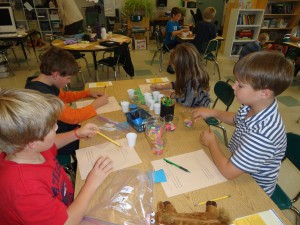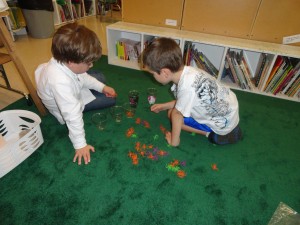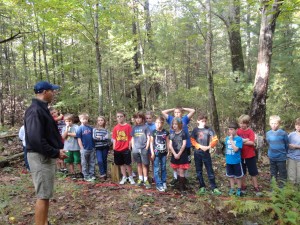Our time zips by each week. I am surprised each Friday morning when I sit down to write to you that is it time for that to happen. It always seems that our week just began moments ago.
Final Preparations for NECAP
This week we continued to explore the NECAP formats and vocabulary so the children will feel comfortable with them as they start next week. They seem ready and aware of what we’ll be doing. They are certainly committed to doing their best and working hard to meet the challenge.
We learned about justification and how to provide proof for the things we say and write. We talked about evidence and details. We practiced using them in our daily reading responses while listening to chapter read aloud and we practiced using them on release items from the test. Each of these habits is important to continue beyond our testing weeks. We hope you will begin to see more complete, thoughtful responses to a variety of learning explorations as the year progresses.
We explored vocabulary they are almost certain to see on the NECAP – suffix, prefix, perimeter, fewest and blackline drawings of coin (most often shown as tales).
Continuing to Explore How We Are Smart
SEL- Knowing Yourself as a Learner – Knowing Your Place in the Learning Community
We began to learn about paragraphing while writing about our eight different intelligences. The children know that the most important facts about themselves in each of the areas lead the paragraphs. These leads are supported with evidence and details to create a picture in the reader’s mind. We started to think about engaging leads and why they are important in connecting the writer and the reader. This is a challenging task. The children are struggling to find words for what they feel and know. You may want to ask your child how they are describing their different intelligences. Talking about it may help make find the words when they go to write about it easier. We often talk about being good at things and not so good at others, but we don’t often go further to discuss the proof. In this exploration we are not exploring good or bad. We are exploring what is and beginning to think about the reasons why we make the choices we do. How are you smart? Have you ever stopped to think about that – you are some of all eight intelligences. How would your pie chart be divided?
The major theme of our work in the first six weeks of school has been to examine how we work together as a community of learners so that each person can be honored as an individual as well as an important part of the whole. Along with learning about the Theory of Multiple Intelligences we have also explored our strengths as readers, writers and mathematician. We have considered different way to capture what each of the children is able to do at this time in the year. We are collecting samples, photographs and audio samples to establish a starting point for our year. From this point the children will set goals for themselves as learners. They will share these, along with their Multiple Intelligence descriptions in a fall student led conference at the end of October and beginning of November
Exploring Place Value and Patterns with Number
This week we continued our work with estimation and understanding and visualizing the amounts larger numbers represent. We counted collections and provided justification for our counts by choosing a representational strategy to organize the materials. We counted by 30’s and 200’s and we looked for patterns in the numerals as they grew from 130 and from 5,200. It was interesting to note that as we approached the 9,200…9,400… count children began excitedly to whisper “we’re going to get to 1 million.” We did not. We did reach 12,000 and had a rich discussion about how patterns grow differently with odd and even amounts.
Through our work children are developing a more secure understanding of place value. I am hearing less of “ add 3 and 4 and that’s 7” when they are dealing with hundreds. They are actually saying of the amounts as 300 and 400 – an important thing before we teach the standard algorithm. Children are also learning about the  periods of number and gaining greater understanding of our number system beyond 100’s.
periods of number and gaining greater understanding of our number system beyond 100’s.
Learning About Genre
This week we added another step to our daily record of reading – indicating the genre. The children have the list we are using in the classroom in their homework folders to use on their home reading records as well. If children complete their reading records accurately, over time they will be able to learn more about their reading habits and how their choice lead to success. That is what it is all about – being successful at what you both need and want to do.
Different genre require the children to think in different ways in order to understand them – poetry is different from folktales that are in turn different from historical fiction which is different from informational text too. All can be about elephants, but understanding and trying to discover the authors’ intent requires a different combination of strategies. Over the course of the school year the children will be reading different genre, responding to them and examining the traits of each type of text as a way toward understanding.
Many of the children are consuming the graphic novel series we have in the classroom. Graphic novels are quick reads, but their stories are often complicated and mysterious. That is just what the children are looking for. They are transitioning from formulaic series and looking for more complex plots. They are stuck in an interesting place – many series lack the depth they seek, but the next step seems too dense. Some of the children have found chapter books they love, but many move daily from title to title because they want more complex stories, but they have not yet developed the stamina to stick with a longer book. To understand the characters, setting and get introduced to the plot, children generally need to stick with a book through the first 4 or 5 chapters. If they are working mightily to understand what they are reading, that is hard to do. It will happen, but it will take time.
Also ask your child about:
Mysteries According to Humphrey
Counting Collections
The incredible poems about learning members of our class are writing
And working to be funny at the right times…
Have a fabulous weekend!
